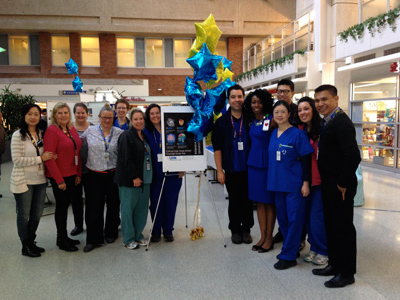
In October 2013, members of Toronto General and Toronto Western Hospitals’ four
critical care teams showcased their units’ cutting-edge technology, inter-professional
services and best practices during Critical Care Week. (Photo: UHN)
In an ICU, patients and families are at their most vulnerable.
Patients require constant, close monitoring and medications and support from specialized equipment to maintain normal bodily functions.
Highly trained doctors and critical care nurses work closely with a team of social workers, spiritual care advisors, respiratory therapists, perfusionists and other specialists to treat the every aspect of the patient’s health.
UHN has four Intensive Care Units. They include:
- Coronary Intensive Care Unit (Toronto General Hospital)
- Cardiovascular Intensive Care Unit (Toronto General Hospital)
- Medical Surgical Intensive Care Unit (Toronto General Hospital)
- Medical Surgical Neuro Intensive Care Unit (Toronto Western Hospital)
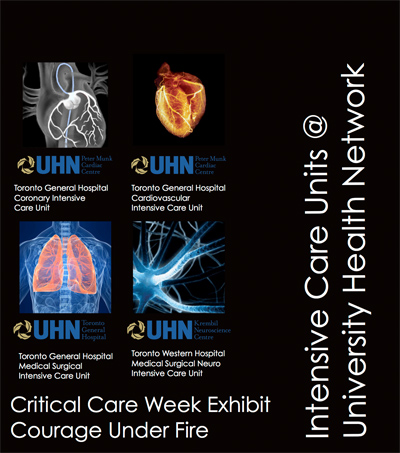
What makes UHN’s ICUs exemplary?
First and foremost, it’s the committed, caring people who work in UHN’s ICUs that make it exceptional. These professionals are amazing models of inter-professional teams; each member has a particular role, contributes and collaborates. They’re highly specialized, compassionate and respect the values and needs of patients and their families. The four units also collaborate to share best practices.
Reacting to the unexpected
What goes on in UHN’s ICUs can be unpredictable. Caregivers often need to react to emergencies like cardiac arrests, or the after effects of spinal cord injuries, strokes, post-transplant complications or multisystem failure, to name just a few conditions. They deal with crisis situations every day.
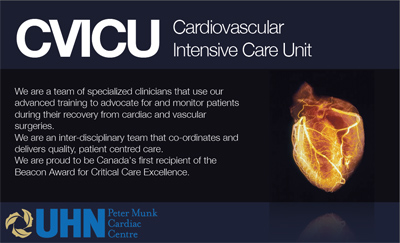
What patients can count on
The calibre of clinical care provided to patients at UHN is world-class. The patient is the centre of everything. In addition, in serious or fatal situations, staff provide emotional support to patients, family members as well as colleagues. They also do "the little things" that count, like washing a patient's hair in bed when he or she cannot make it to the shower. They work as a close-knit family to provide the best possible care.
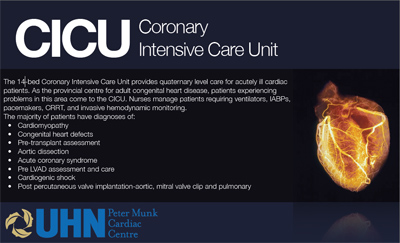
Technology and clinical know-how
Care is complex. The ICUs are equipped with cutting-edge technology that allows staff to perform interventions that are not common in other hospitals. Machines such as the left ventricular assist device (LVAD), a mechanical pump that's used to support heart function and blood flow in people who have weakened hearts and the
Extracorporeal Life Support (ECLS) machine, which have brought patients back from the brink of death, are part of standard care.
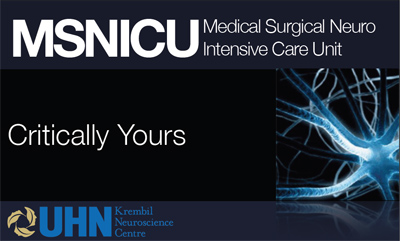
'Can do' attitudes
A patient in a coma, who was at death's door for several months, was kept alive on ECLS. She was able to leave the hospital after 10 months. Denise Morris, the unit's Nurse Manager, proudly recounts, "We push the limits. No one would have thought of asking a patient to walk while hooked up to an ECLS machine, but we did. We have a philosophy of, 'Why not try it? Don't tell me why I can't. Tell me how I can,'."
Watch "Making MSICU Extraordinary"
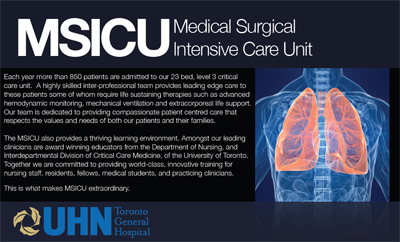
Constant learning – long-term commitment
The culture of learning contributes to employee retention and attracts new staff. Educators provide on-going world-class innovative training and mentorship for nurses, residents, fellows, medical students and practicing clinicians. Units participate in local, national and international research programs.
The need for critical care is not a choice, but if needed, patients and families receive outstanding care at UHN's four ICUs.
Related
Other technology used at UHN's ICUs:
